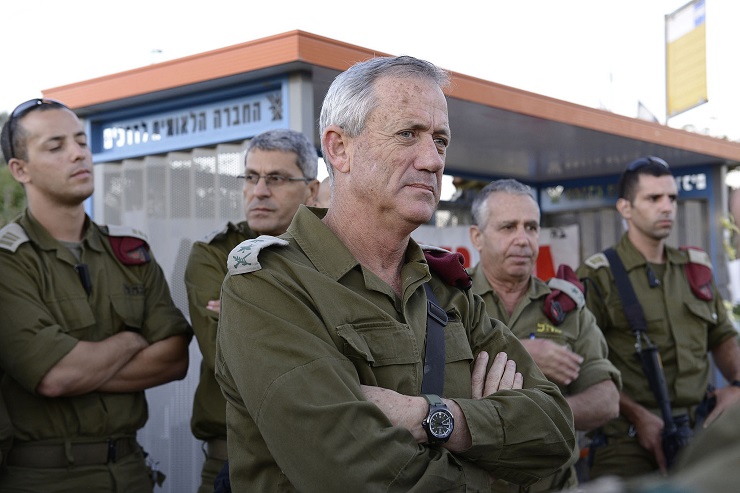According to Israeli Minister of Defense Benny Gantz, Israel and the US have recently been working hard to establish a formal “Middle East air defense alliance.” The minister said that the matter would be discussed in depth during US President Joe Biden’s visit to Israel, scheduled for July 13-14.
At a meeting of the Israeli Foreign Affairs and Defense Committee, Gantz said that this air defense alliance had allegedly “already thwarted Iranian attempts to challenge Israel” and other countries in the region. Although he gave no other details on such an alliance, Gantz did specify that opposition to Iran would include the use of drones and missiles. “Over the past year I have been leading an extensive program, together with my partners at the Pentagon and in the US administration, that will strengthen the cooperation between Israel and countries in the region,” he concluded, clearly betting on the possibility of expanding military cooperation with Arab countries already allied with Tel Aviv under the Abraham Accords.
This statement by the Israeli minister came amid rising tensions between Tel Aviv and Tehran over the possibility of Iran developing nuclear weapons, which Israel, together with the United States, hopes to use in forming a new regional anti-Iranian alliance. Earlier, there were media reports of suspected Iranian involvement in the killing of two Iranian nuclear scientists (Ayoub Entezari and Kamran Aghamolaei, an aeronautical engineer and geologist, respectively), who died days apart in accidents under unclear circumstances.
The creation of regional clones of NATO – some kind of defensive formations “in the image and likeness” of the North Atlantic Alliance to “ensure stability in regions” of interest to the US without the latter’s significant presence – has been actively promoted by Washington for decades in its communications with allies in various regions of the world. Such attempts are particularly intense in the Middle East region, where it is not the first time that an attempt has been made to create an “outsourced defense.”
For this reason the term “Middle Eastern NATO” has been circulating quite frequently in many Western publications, expert papers and in Western media coverage of Washington’s numerous contacts with representatives of the region’s political and military elite. Most US attempts to create such defensive organizations have been limited to the “allied” Arab states, although the concept of blocs has not been limited to the Arab world; at various points in time the US has tried to include Turkey and Israel.
One of the first attempts to create such a “Middle Eastern NATO” is probably the Joint Arab Rapid Response Force (JARRF), established in 2014 at the initiative of Egypt to jointly counter security threats within the territory of the League of Arab States. At the time Washington not only supported this concept proposed by Cairo, but also “advised” on the prospect of transforming the JARRF into an independent political and military organization that could maintain regional stability without the direct involvement of US forces. This project was then dubbed “Arab NATO” by Western experts and included 6 Arab countries (Egypt, Saudi Arabia, Jordan, Morocco, Sudan, Qatar) as well as Israel, which was included in a limited format as an “intelligence state” and its participation was mainly limited to supplying the organization with intelligence with US mediation. The organization in this format survived for three years without taking any serious steps to institutionalize the JARRF or to include new members from among the LAS countries, positioning itself as an internal LAS project. This has frankly fallen short of Washington’s hopes for a “more serious transformation” of the regional military bloc in question. To a certain extent, this positioning of the JARRF was also due to the fact that a number of strong regional players (notably the UAE) refrained from participating in this project, preferring to develop security policies on their own. For the GCC states, for example, through the “Istanbul Cooperation Initiative.”
During the Trump presidency, attempts were made to create an alternative defensive alliance in the region, the Middle East Strategic Alliance (MESA), which, in addition to the military, assumed the existence of economic instruments to deter potential adversaries and attempted to introduce some structural, purely military elements: the Standing Committee on Military Planning, the Departments for Information Exchange and Military Investment, the Collective Cyber Command, etc. This has already allowed many experts to draw some parallels between MESA and NATO. It is notable that despite US plans to expand this alliance to cover the entire Middle East, including Turkey and Israel, it has already made an exception for Iran, which, according to MESA doctrine, could not become part of this alliance as a “disruptive player.”
However, for a number of reasons, this “constructive work” did not succeed, largely due to a dramatic shift in US foreign policy priorities. With the arrival of President Joe Biden in the White House, the concept of the “Middle Eastern NATO” was once again revisited, and the MESA project was first temporarily frozen by the White House and then, by the end of 2021, declared unrealizable.
Under these circumstances, the project being considered by Tel Aviv and Washington to create the “Middle East air defense alliance” could well be another attempt by the US to revive the idea of forming a new regional military alliance, similar to AUKUS and QUAD in the IPR. However, this time with Israel, rather than Arab states, playing the leading role in such a regional alliance. These plans can certainly be monitored in more detail as a result of Joe Biden’s forthcoming visit to Israel.
Vladimir Platov, expert on the Middle East, exclusively for the online magazine “New Eastern Outlook”.

